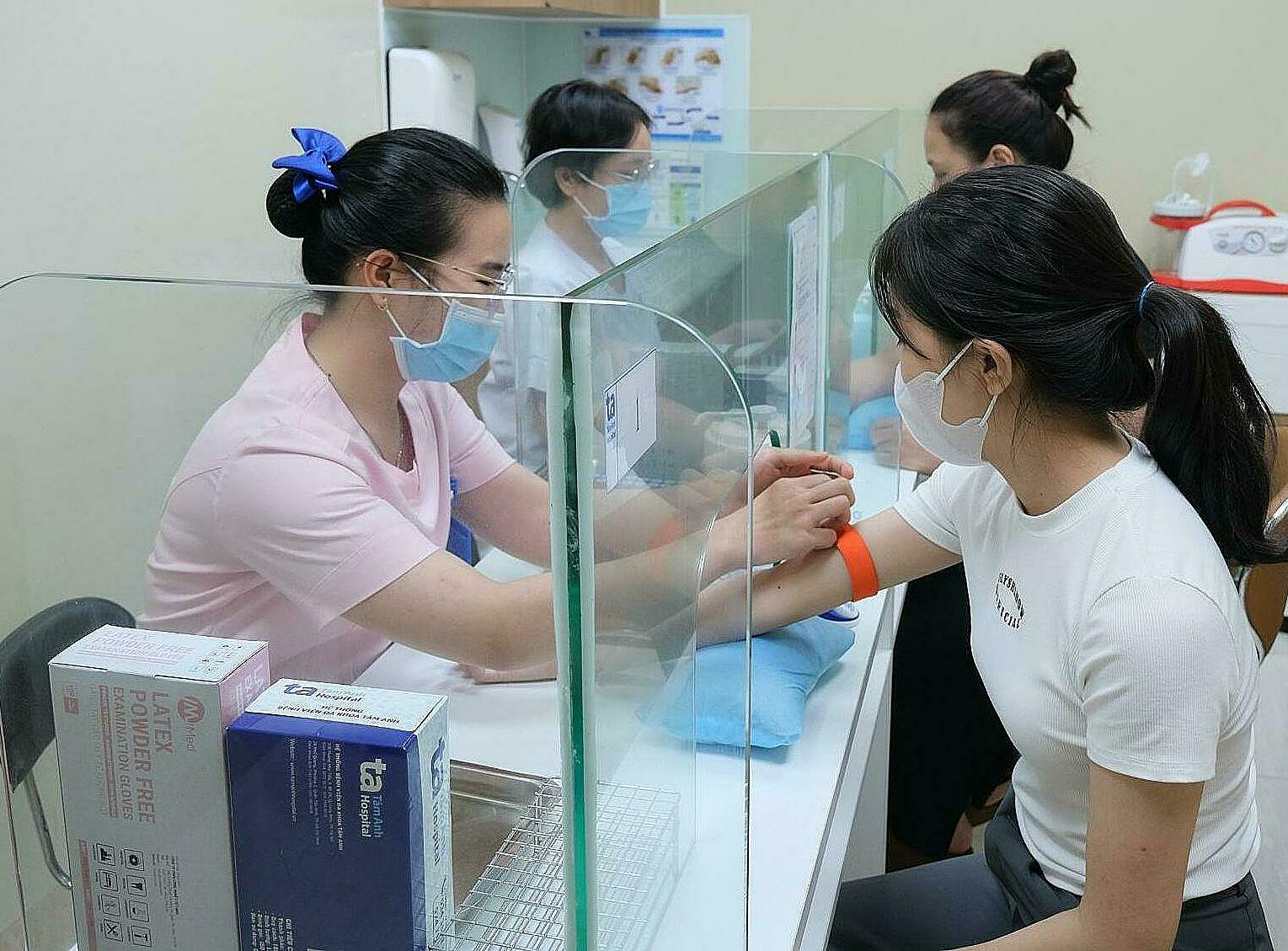Doctor Nguyen Phuong Thao, from the Fetal Medicine Center at Tam Anh General Hospital in TP HCM, said the global prevalence of congenital disorders is estimated at 5-7%. Statistics show that about 33% of children with genetic disorders are born to healthy parents or those with no family history.
With recessive inheritance, a child inherits two copies of an abnormal recessive gene - one from the father and the other from the mother. "In many cases, parents carry recessive genes, which do not manifest as a disease but seriously affect the next generation," Dr. Thao said, adding that every pregnancy has a random genetic risk, whether the parents are healthy or not.
Single-gene genetic disorders (determined by one gene) such as spinal muscular atrophy, thalassemia, hemophilia, cystic fibrosis, G6PD deficiency... cause many health problems. Dr. Thao cited research showing that about one-half of congenital disorders caused by variants in single genes can be detected by genetic testing.
My, 31, gave birth to a son three years ago, but he had spinal muscular atrophy and died at one year old. This is an inherited neuromuscular disease caused by a recessive gene mutation on chromosome 5. The disease gradually destroys nerve cells in the brainstem and spinal cord that control essential musculoskeletal activities such as speaking, breathing, swallowing, and walking.
Before her second pregnancy, My and her husband had a medical examination and were advised to have genetic testing. The results showed that both husband and wife carried the recessive gene for spinal muscular atrophy. During this pregnancy, she had a chorionic villus sampling at 12 weeks, and the doctor diagnosed that the fetus did not carry two recessive genes for spinal muscular atrophy. My gave birth to a healthy daughter at 38 weeks.
Similarly, Lanh, 28, and her husband had their first healthy child. In the next pregnancy, at 21 weeks, Dr. Thao diagnosed the fetus with bilateral polycystic kidney disease with oligohydramnios. Amniocentesis results showed that the fetus carried two compound heterozygous recessive genes (the fetus received two different mutations on the same gene from both parents), causing polycystic kidney disease. The child is at risk of death a few weeks after birth or progressing to end-stage renal failure requiring lifelong dialysis or kidney transplant. Lanh and her husband decided to terminate the pregnancy. Subsequent genetic testing of the couple revealed that both carried the recessive gene.
The doctor said the chance of having another child with the disease is 25%. They decided to have in vitro fertilization to eliminate the two recessive genes using PGT-M genetic technology and gave birth to a healthy son at 39 weeks.
 |
Dr. Thao provides genetic counseling to a pregnant woman. Photo illustration: *Tam Anh General Hospital* |
Premarital or pre-pregnancy genetic screening helps detect genetic risks for couples before having children. From there, doctors provide accurate and complete information to help them prepare appropriate reproductive plans and reduce the risk of children having genetic diseases. Genetic screening before or during pregnancy also contributes to optimal pregnancy management, psychological preparation, and treatment costs if the fetus is diagnosed with a disease.
According to Dr. Thao, advances in genetic technology (PGT-M, PGT-A, PGT-SR, NGS) also help increase the chances of having healthy children. If couples choose in vitro fertilization, embryos can be screened to eliminate genetic abnormalities before being transferred to the mother's uterus. Pregnant women can choose to have NIPT (non-invasive prenatal testing) at 12 weeks to screen for chromosomal abnormalities. If abnormalities are detected during pregnancy, chorionic villus sampling or amniocentesis can be performed to determine the exact cause.
Dr. Thao recommends that couples planning to have children or who are pregnant should have genetic screening, especially those who have given birth to a child with a birth defect or genetic disease, have a history of miscarriage, stillbirth, unexplained infertility, or have family members who have given birth to children with birth defects or developmental delays. "Vietnamese people are in a high-risk group for carrying the thalassemia gene, so couples should be screened for this disease before pregnancy to reduce the risk of disease for their children," she said.
According to the recommendations of the World Health Organization (WHO) and the American College of Obstetricians and Gynecologists (ACOG), spinal muscular atrophy (SMA) gene screening should be performed for all those planning to become pregnant and those who are pregnant. Depending on the wishes of the future parents, there are expanded genetic screening test panels with many other autosomal recessive gene tests as well as sex chromosome recessive inheritance gene tests.
 |
Young women have blood tests and health checks before pregnancy. Photo illustration: *Tam Anh General Hospital* |
It is estimated that about 13 million Vietnamese people carry gene mutations for thalassemia, mostly silent carriers and those carrying the disease gene who can pass it on to the next generation. Vietnam also records about 40,000 children with genetic diseases each year. Among them are 1,400-1,800 children with Down syndrome, 200-250 children with Edwards syndrome (causing early death after birth), 1,000-1,500 children with neural tube defects, 300-400 children with congenital hypothyroidism, 15,000-30,000 children with G6PD deficiency, 200-600 children with congenital adrenal hyperplasia, 2,200 children with severe thalassemia and other genetic diseases and birth defects.
Ngoc Chau
*Patient names have been changed.
| Readers ask questions about obstetrics and gynecology here for doctors to answer. |












